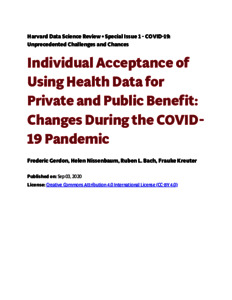|
Individual acceptance of using health data for private and public benefit: Changes during the COVID-19 pandemic
Gerdon, Frederic
;
Nissenbaum, Helen
;
Bach, Ruben L.
;
Kreuter, Frauke
;
Zins, Stefan
![[img]](https://madoc.bib.uni-mannheim.de/58693/1.hassmallThumbnailVersion/edf2fc97-bdfa-4727-8554-c724cfc50d28.pdf)  Vorschau |
|
PDF
edf2fc97-bdfa-4727-8554-c724cfc50d28.pdf
- Veröffentlichte Version
Download (59kB)
|
|
DOI:
|
https://doi.org/10.1162/99608f92.edf2fc97
|
|
URL:
|
https://madoc.bib.uni-mannheim.de/58693
|
|
Weitere URL:
|
https://hdsr.mitpress.mit.edu/pub/3uc0p5dq/release...
|
|
URN:
|
urn:nbn:de:bsz:180-madoc-586935
|
|
Dokumenttyp:
|
Zeitschriftenartikel
|
|
Erscheinungsjahr:
|
2021
|
|
Titel einer Zeitschrift oder einer Reihe:
|
Harvard Data Science Review : HDSR
|
|
Band/Volume:
|
3
|
|
Heft/Issue:
|
Spec. Iss. 1
|
|
Seitenbereich:
|
1-27
|
|
Ort der Veröffentlichung:
|
Cambridge, MA
|
|
Verlag:
|
MIT Press
|
|
ISSN:
|
2644-2353
|
|
Verwandte URLs:
|
|
|
Sprache der Veröffentlichung:
|
Englisch
|
|
Einrichtung:
|
Außerfakultäre Einrichtungen > GESS - CDSS (SOWI)
Fakultät für Sozialwissenschaften > Statistik u. Sozialwissenschaftliche Methodenlehre (Kreuter 2014-2020)
Außerfakultäre Einrichtungen > MZES - Arbeitsbereich A
|
|
Bereits vorhandene Lizenz:
|
 Creative Commons Namensnennung 4.0 International (CC BY 4.0) Creative Commons Namensnennung 4.0 International (CC BY 4.0)
|
|
Fachgebiet:
|
300 Sozialwissenschaften, Soziologie, Anthropologie
|
|
Abstract:
|
In times of increasing digitization, the protection of individual data privacy becomes more important than ever before. To craft privacy policies that do not only meet legal requirements, but also address the public’s concerns, understanding individual privacy attitudes is key. Previous research suggests that privacy attitudes depend on a set of parameters related to the data type, data collector and other situational characteristics. However, the importance of single situational characteristics may possibly be altered by changes in the environment. This circumstance becomes apparent and even more important with the outbreak of the COVID-19 pandemic. The pandemic constitutes an exceptional situation in which individuals may be willing to transmit more personal data than usual for the sake of public health and safety. In this study, we analyze how attitudes towards acceptable data use shift in times of crisis. In July 2019, long before the pandemic, we conducted a survey in Germany in which we measured respondents’ acceptance of the collection and use of health data for public health purposes including preventing the spread of a virus. As the pandemic set in, we replicated this survey in the spring of 2020 to investigate changes in respondents’ willingness to share data for public health purposes in response to the crisis. Using data from 3,502 respondents, we demonstrate and quantify the shift in privacy attitudes with situational characteristics. Public acceptance of the use of personal health data to combat an infectious disease outbreak increased notably, while acceptance of personal data use in several other scenarios barely changed over time. We conclude that policymakers need to carefully consider the intended purpose of and appropriate limitations on data use for public health and argue that the design of data collection tools should meet both public health and privacy concerns.
|
 | Dieser Eintrag ist Teil der Universitätsbibliographie. |
 | Das Dokument wird vom Publikationsserver der Universitätsbibliothek Mannheim bereitgestellt. |
 Suche Autoren in Suche Autoren in
BASE:
Gerdon, Frederic
;
Nissenbaum, Helen
;
Bach, Ruben L.
;
Kreuter, Frauke
;
Zins, Stefan
Google Scholar:
Gerdon, Frederic
;
Nissenbaum, Helen
;
Bach, Ruben L.
;
Kreuter, Frauke
;
Zins, Stefan
ORCID:
Gerdon, Frederic  ORCID: 0000-0003-4442-6698 ORCID: 0000-0003-4442-6698 ; Nissenbaum, Helen ; Bach, Ruben L.  ORCID: 0000-0001-5690-2829 ORCID: 0000-0001-5690-2829 ; Kreuter, Frauke  ORCID: 0000-0002-7339-2645 ORCID: 0000-0002-7339-2645 ; Zins, Stefan
Sie haben einen Fehler gefunden? Teilen Sie uns Ihren Korrekturwunsch bitte hier mit: E-Mail
Actions (login required)
 |
Eintrag anzeigen |
|
|
 ORCID: 0000-0003-4442-6698 ; Nissenbaum, Helen ; Bach, Ruben L.
ORCID: 0000-0003-4442-6698 ; Nissenbaum, Helen ; Bach, Ruben L.  ORCID: 0000-0001-5690-2829 ; Kreuter, Frauke
ORCID: 0000-0001-5690-2829 ; Kreuter, Frauke  ORCID: 0000-0002-7339-2645 ; Zins, Stefan
ORCID: 0000-0002-7339-2645 ; Zins, Stefan



 Creative Commons Namensnennung 4.0 International (CC BY 4.0)
Creative Commons Namensnennung 4.0 International (CC BY 4.0) Suche Autoren in
Suche Autoren in